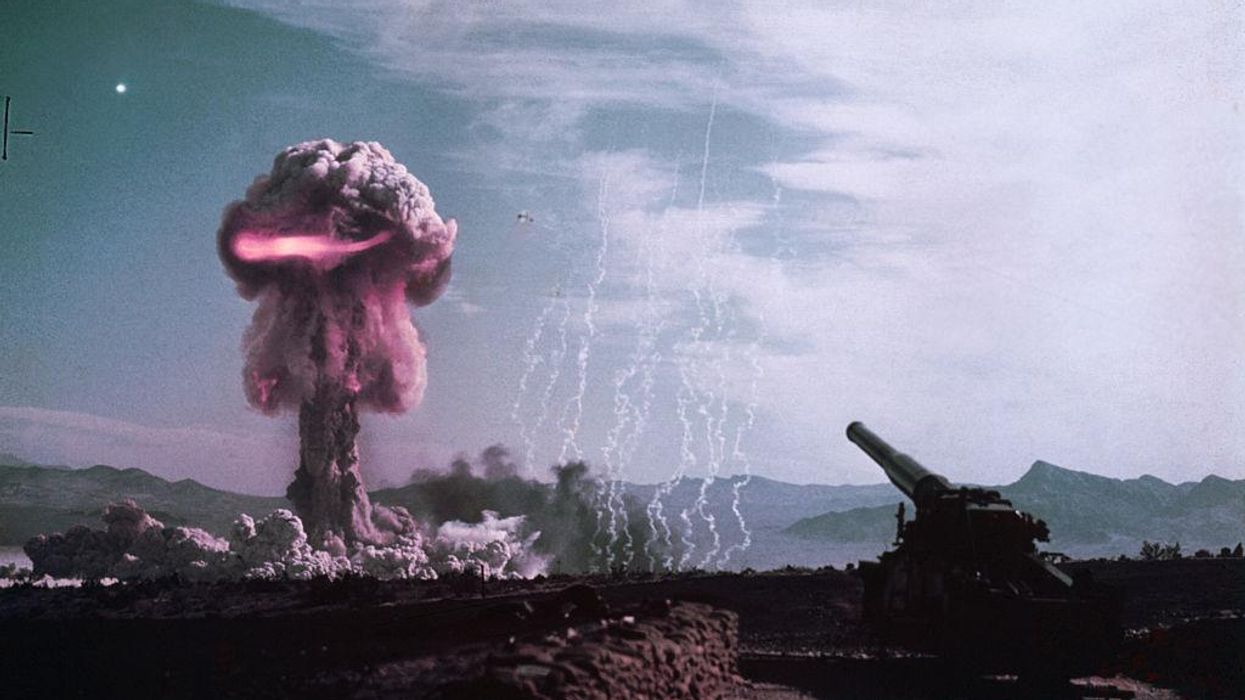
Image: Bettmann via Getty Images

The Pentagon revealed in its new "National Defense Strategy" that it will dispense with President Joe Biden's pledge only to use nuclear warheads to deter or respond to a nuclear attack. Instead, the U.S. will now deploy nuclear weapons to "deter not only nuclear attack, but also a narrow range of other high consequence, strategic-level attacks."
The Pentagon report suggested that its updated policy pertaining to targeting non-nuclear threats with nuclear weapons was the result of a "thorough review of a broad range of options for nuclear declaratory policy – including both No First Use and Sole Purpose policies."
The department concluded that "those approaches would result in an unacceptable level of risk in light of the range of non-nuclear capabilities being developed and fielded by competitors that could inflict strategic-level damage to the United States and its allies and partners."
This change represents a significant about-face for Biden, who campaigned in 2020 on the Democratic Party's platform, which rejected "a return to an old era of grave nuclear dangers"; called for a reduction of American nuclear stockpiles; and insisted that the "sole purpose of our nuclear arsenals should be to deter — and, if necessary retaliate against — a nuclear attack."
The Democrat platform to which Biden subscribed also criticized former President Donald Trump for seeking to build new nuclear weapons, calling the initiative "unnecessary, wasteful, and indefensible."
The Biden administration has recently determined that nuclear upgrades are not so unnecessary after all.
Politico reported this week that the U.S. has "accelerated the fielding of a more accurate version of its mainstay nuclear bomb" to European NATO bases. The B61-12 air-dropped gravity bomb will be delivered in December rather than next spring, given the urgency created by nuclear tensions with Russia.
The Pentagon noted that "by the 2030s the United States will, for the first time in its history, face two major nuclear powers as strategic competitors and potential adversaries": Russia and communist China.
China is reckoned to be the far greater threat, as it is “the only competitor with both the intent to reshape the international order, and, increasingly, the economic, diplomatic, military, and technological power to advance that objective."
Russia was recognized in the report as an "acute threat," presenting "serious, continuing risks in key areas" and presenting "nuclear threats to the homeland and U.S. Allies and partners."
While Russia poses a threat to America and its allies, it also bolsters a greater threat.
"Although diverging interests and historical mistrust may limit the depth of their political and military cooperation," the Pentagon indicated that communist China and Russia continue to develop and strengthen their alliance. This alliance "could seek to create dilemmas globally for the Joint Force in the event of U.S. engagement in a crisis or a conflict with the other."
China, deemed America's most "consequential strategic competitor," may only have an estimated 350 nuclear warheads (Russia has roughly 5,977 and the U.S. has 5,428), but it intends to have 1,000 by decade's end. Furthermore, it is taking "increasingly coercive actions to reshape the Indo Pacific region and the international system to fit its authoritarian preferences."
The report suggested that the world "expects nuclear powers to act responsibly," but that the U.S. "has made little progress" with China despite consistent efforts.
Chinese dictator Xi Jinping recently intimated that conflict between China and the U.S. was on the horizon, stating, ""Be mindful of dangers in the midst of peace. ... Get the house in good repair before rain comes, and prepare to undergo the major tests of high winds and waves, and even perilous, stormy seas."
The Pentagon report indicated that for the U.S. to "maintain credible and effective deterrence of both large-scale and limited nuclear attacks from a range of adversaries," it would have to do what Trump demanded in 2018: "Modernize and rebuild our nuclear arsenal, hopefully never having to use it, but making it so strong and so powerful that it will deter any acts of aggression by any other nation or anyone else."
Extra to modernizing "nuclear forces, nuclear command, control, and communications, and the nuclear weapon production enterprise," the strategy report said the Pentagon will also "bolster regional nuclear deterrence" by working closely with American allies.
The authors of the report concluded, "For the foreseeable future, nuclear weapons will continue to provide unique deterrence effects that no other element of U.S. military power can replace."
Bloomberg reported that Mackenzie Eaglen, a fellow at the American Enterprise Institute, was "struck" by how emerging geopolitical threats have prompted both the Trump and Biden administrations as well as members of both parties to adopt a similar approach to defense.
Eaglen said, "They're willing to postpone their visionary policies in light of the harsh reality on nukes from China and Russia."